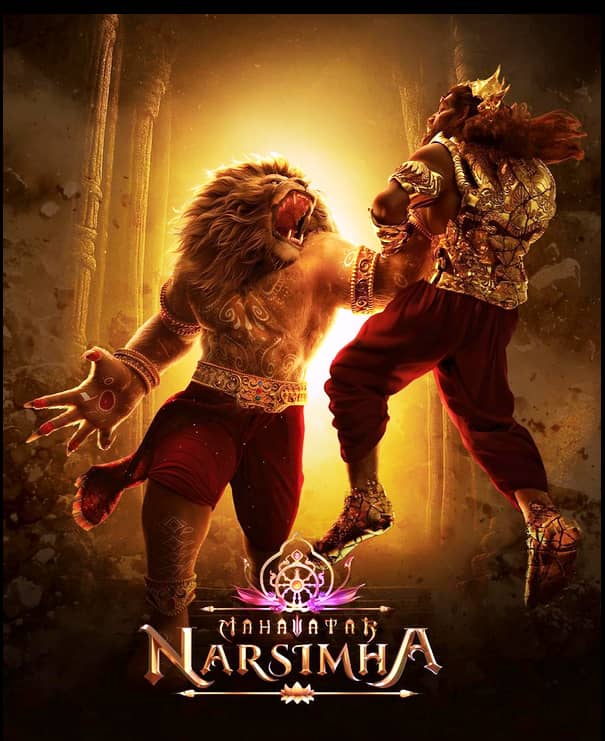
by Sam Trailerman
Mahavatar Narsimha isn’t just a movie — it’s a cinematic yajña, a sacred offering to the spirit of devotion and divine mythos.
As the first chapter of a planned seven-part Mahavatar Cinematic Universe, this animated epic anchors itself in the Dashavatara—the 10 avatars of Lord Vishnu—building toward Mahavatar Kalki Part 2 in 2037 (Oh, that’s 12 years of anticipation from now!).
Directed by Ashwin Kumar, it was written by Jayapurna Das. It was produced by Kleem Productions and Hombale Films.
The film masterfully weaves the legends of Varaha, the valiant boar who rescues Mother Earth, and Narsimha, the lion-man incarnation who destroys tyranny. When Hiranyaksha is vanquished, the wrath shifts to his brother Hiranyakashipu, a megalomaniac empowered by a boon, who proclaims himself a god and persecutes Vishnu’s devotees.
But faith finds its champion in Prahlad, the unwavering son of Hiranyakashipu. His devotion summons Narsimha—half lion, half man—who rips through illusion and ego to restore dharma. The climactic confrontation is not just mythological…It’s metaphysical.
Clocking in at 2 hours and 10 minutes, the film balances epic scale with narrative precision. At the time of writing, over 21,000 IMDb users have crowned it with a towering 9.5/10 rating—a garland of reverence for its grandeur.
What sets this movie apart?
* Soul-stirring score that chills and uplifts—from meditative chants to explosive war drums
* Vivid animation that honours tradition while dazzling with modern artistry
* Screenings so sacred that in India and elsewhere, audiences remove their footwear in humble reverence as they enter cinemas.
* A cast and crew that followed a strict sattvic vegetarian diet throughout filming to maintain spiritual purity on set
Premiered at the International Film Festival of India in November 2024 and globally released in July 2025 in 2D and 3D, Mahavatar Narsimha isn’t content to entertain—it transforms.
As the divine wrath reverberates through each frame, viewers feel the weight of cosmic justice. Goosebumps aren’t optional in this movie. They’re inevitable.
This film doesn’t just depict dharma. It delivers it. Mahavatar Narsimha is devotional cinema at its peak—a reminder that film can be a vehicle of awakening, a spark to the sacred that lingers long after the credits roll.
If you are a devotee of Vishnu, a lover of mythological storytelling, or simply a spiritual seeker, Mahavatar Narsimha offers more than narrative—it offers transcendence. In a world flooded with fleeting content, this film stands as an eternal adventure, echoing divine names and cosmic truths days, even weeks, after viewing.
Narsimha Fever isn’t hype—it’s revelation.
WE